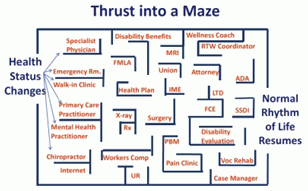Webility's Philosophy & Approach
 Webility’s mission is to help fill some holes
in today’s social fabric that are creating needless impairment and disability, work absence, and loss of employment.
Too often today, individuals who are struggling to cope with a health condition that is disrupting their lives are left to fend
for themselves when it comes to getting good care that restores or preserves their ability to function in life and stay at or return to work.
Webility’s mission is to help fill some holes
in today’s social fabric that are creating needless impairment and disability, work absence, and loss of employment.
Too often today, individuals who are struggling to cope with a health condition that is disrupting their lives are left to fend
for themselves when it comes to getting good care that restores or preserves their ability to function in life and stay at or return to work.
If they lack the vision, skill, or energy to make the right things happen, they fall through the gap and join the ranks of the unemployed people with disabilities. Worklessness is an unfortunate outcome with bad consequences for physical, mental, and social health. For most people, leaving work and going on disability ends up being a life of poverty.
We subscribe to:
- The bio-psycho-socio-economic model to aid our understanding of the many factors other than biology that produce sickness and disability.
- The work disability prevention model which shows us how to minimize the harmful impact of illness, disease, and disability on working age people’s lives.
- The multi-dimensional approach to mobilizing resources and approaches for effectively helping people who are ill, injured, or impaired to fulfill their human potential.
We bring together professionals in different professions, organizational silos, or sectors of society — those regularly called on to respond when health conditions imperil working age people’s employability and thus, their future well-being. We build agreement among these stakeholders about the need to prevent the human harm and wasted resources produced by needless impairment and work disability — the impact on individual and family well-being as well as the burden on employers, the community, the local and national economy, government programs, and the taxpayers.
Together, we can:
- Build a shared vision for how things should go when people’s lives are being derailed by illness, injury, aging, or congenital conditions.
- Stop creating “iatrogenic invalids” and “system-induced work disability.”
- Provide a “point” for health care by asking this question: “well enough for what?”
- Declare that the fundamental reason for healthcare and other helping services is to protect, preserve, and enhance each person’s ability to fulfill their destiny as human beings: to function and participate as fully in life as practical and possible under their circumstances.
- Use functional outcomes as practical indicators of the effectiveness and value of helping services.
- Find ways to help keep working age people productive and economically independent.
- Bridge the communications gap that separates medical offices from employers and benefits administrators.
- Improve the stay-at-work and return-to-work process until it consistently creates better outcomes.